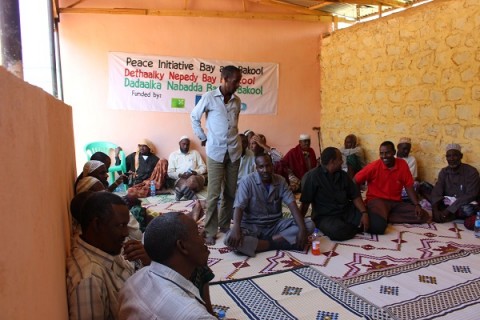Many clan conflicts have been settled in the South West State of Somalia
Many disputes have been settled in the past few months throught the Peace Initiative of the South West State of Somalia, a project supported by the European Union and implemented by Finn Church Aid (FCA). Cycles of revenge between clans have been broken, and cease-fires established. At the same time, people who have been forced to flee the violence have been able to return home.
Disputes have been settled in three regions in South West Somalia: Bay, Bakool and Lower Shabelle, in the months of late last year and the beginning of this year.
Late last year, Finn Church Aid and its Somalian partner CRD organised a Common Peace Committee meeting with the goal of resolving a conflict between the Luway and the Geledle clans in the Manaas region, approximately 25 kilometres south of Baidoa.
“The dispute started from farmland tenure. Ten people died and many villages were burnt down. People were forced to leave their homes and flee to other villages and other clans,” explains Ali Ibrahim, the coordinator of the Bay, Bakool and Lower Shabelle Peace Initiative.
In an emergency meeting, the Common Peace Committee and representatives from the two clams decided to form a committee of nine members from the disputing parties. The committee then visited Manaas and managed to bring about a cease-fire.

Together with its local partner, Finn Church Aid organised a peace committee meeting in Somalia late last year. The meeting resulted in a peace agreement. Photo: Ali Ibrahim.
Reconciliation instead of revenge
Another notable success is the mediation of two major conflicts in Baidoa, is the Bay region. “The first mediation was between the clans of Leysa and Emid. One hundred people participated in the first reconciliation meeting,” Ali Ibrahim says.
The conflict between the two clans begun in November, 2013, when four members of the Leysa clan were killed and a nine-year-old child was injured in a dispute over grazing land and the right to use a watering post. Traditionally such disputes are resolved with revenge, attempting to kill as many members of the enemy clan as you lost. Another option in clan dispute mediation is agreeing on material compensation. However, when dealing with homicides, the sums grow to such extends that acquiring the amounts of money and camels needed leads to new conflicts.
“The mediation was led by a local peace committee and traditional leaders, in other words, the clan elders. Together they formed the reconciliation committee,” Ali Ibrahim explains.
The reconciliation was a combination of traditional customs and new methods introduced by the peace committee.
The proposed settlement included a notable monetary compensation: the Emid clan was ordered to pay 3,300 dollars for each killed member of the Leysan clan, and 750 dollars for the injured child.
An agreement that drew media attention
The conflict between the tribes of Eelay and Hariin also originated from a dispute over the use of land and water. Members of the Hariin tribe killed two members of the Eelay tribe. This made the Eelay clan members feel so unsafe that they sold their lands and property and moved away.
A previously tested reconciliation model was used for the conflict of these two clans as well.
“The reconciliation committee first had a preliminary meeting with the two parties listing their demands and proposals on how to resolve the conflict. After this meeting the two parties were invited to hear the proposals of the reconciliation committee,” Ali Ibrahim clarifies the proceedings.
After the proposals had been accepted, the parties signed a peace treaty.
“Then the communities had fifteen days to resolve their dispute. At the end of that period, the parties arrived at the office of our partner, CRD, in Baidoa, and asked each other for forgiveness. The reconciliation got a lot of publicity and visibility in the local media,” says Ibrahim.
Text: Hilkka Hyrkkö
The Peace Initiative in South West State is funded by the EU.